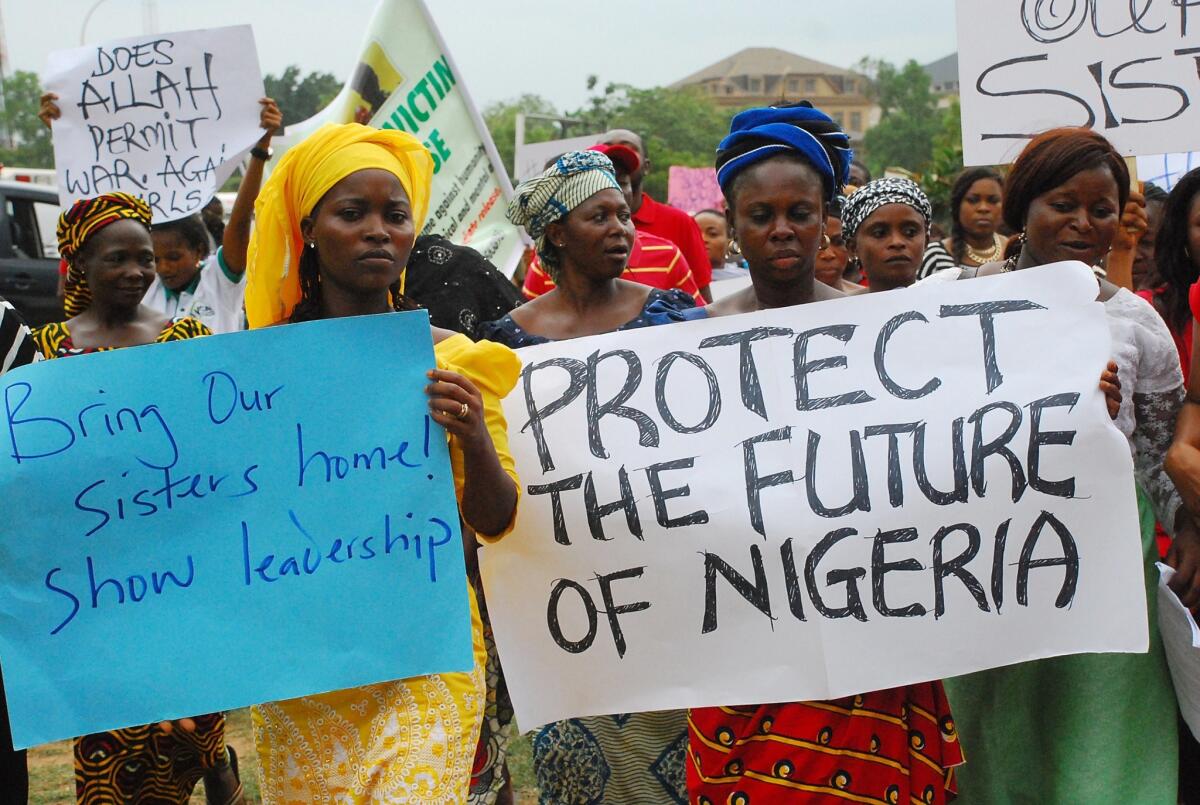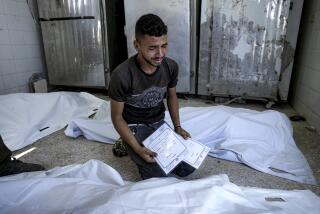Op-Ed: Boko Haram chose its victims for a reason -- to stop progress

Millions of people around the world have tweeted in recent weeks using the hashtag #BringBackOurGirls. That’s an important sentiment, and not just as it relates to the kidnapping of 276 female students by Boko Haram in northern Nigeria.
The region in which the abductions took place is reaching an ecological and social tipping point, and in the years to come, much will depend on its girls.
In a video released on May 4, Boko Haram’s despicable leader, Abubakar Shekau, says: “Girls must give their hands in marriage because they are our slaves. We would marry them out at the age of 9. We would marry them out at the age of 12.”
As despicable as Shekau is, he does understand something: The schooling of girls has the power to transform a culture, which makes it a threat to his kind of repressive fundamentalism. Like blowing up cellphone towers and power plants, kidnapping girls as they take their final exams is a strategy that makes sense if the goal is to stop progress.
If Boko Haram continues to kidnap girls with impunity, then it will be only rational for parents to go back to the age-old cultural tradition of marrying daughters as soon as they reach puberty. To send them to school would risk their being abducted, or worse.
Northern Nigeria is part of the Sahel, the dry southern border of the Sahara, which stretches from the Atlantic Ocean to the Red Sea. It is a region with the most rapid population growth on the planet, and it is among the areas most threatened by global warming.
In 1950 there were 30 million people in all of the Sahel. Today, there are 125 million. In 2050, the United Nations Population Division predicts, there will be 321 million. This unprecedented growth will occur as temperatures are rising by 3 to 5 degrees Fahrenheit. By the middle of this century, more people than currently live in the United States could be watching their crops wither and their livestock die in the Sahel. Already it is estimated that there are 20 million people who are food-insecure in the region, and the United Nations Convention to Combat Desertification estimates that by 2020, as many as 60 million people could have migrated to North Africa and Europe from the Sahel, displaced by the encroaching desert.
In 2012, UC Berkeley hosted an international meeting to examine population, climate and the plight of women in the Sahel. There was agreement among those who gathered that addressing the unfolding humanitarian disaster in the region would require both building local capacity to adapt to climate change and advancing voluntary family planning. And above all, stakeholders and researchers agreed, there would need to be investments in girls’ education. As long as the majority of girls received little education and married before 18, it was hard to imagine they would ever be equipped to participate in the region’s rescue.
Young men can’t be ignored either. The 9/11 Commission report made clear that “a large, steadily increasing population of young men, without any reasonable expectation of suitable or steady employment, [is] a sure prescription for social turbulence.” Boko Haram illustrates that point. But creating greater opportunity for the region’s residents will require a fully integrated approach, and we’re not there yet.
The current U.N. humanitarian strategy for the Sahel notes that crop yields increased by a tiny 1% over the last five years while per capita food supplies fell by 13% “when adjusted for population growth.” But the plan makes no mention of family planning and education activities that have been sorely underfunded. This must change.
History has taught us again and again that unchecked fanatics can bring immeasurable suffering. Even Al Qaeda has disowned Boko Haram. For USAID, UNICEF and charities such as the Bill & Melinda Gates Foundation, the unspeakable crime of capturing teenage girls and forcing them into marriage should be seen as a sort of Pearl Harbor: an urgent call to action. But in this case, sending troops would make the situation worse. Investing in family planning, agriculture and girls are the weapons that can defeat Boko Haram.
Malcolm Potts and Alisha Graves are co-founders of the OASIS Initiative (Organizing to Advance Solutions in the Sahel) at UC Berkeley. (oasisinitiative.org) Potts is the author of “Sex and War: How Biology Explains Warfare and Terrorism and Offers a Path to a Safer World.”
More to Read
A cure for the common opinion
Get thought-provoking perspectives with our weekly newsletter.
You may occasionally receive promotional content from the Los Angeles Times.










